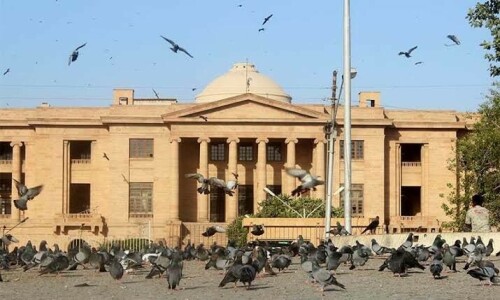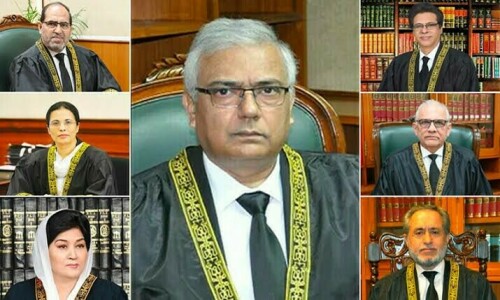• Security operations to be expanded across province
• Night-time travel on inter-provincial highways banned indefinitely
QUETTA: A high-level meeting held with Balochistan Chief Minister Mir Sarfraz Bugti in the chair on Sunday reviewed security arrangements and decided to expand operations against terrorists across the province.
The decision came in the wake of the operation in which six terrorists were killed by the security forces in Kalat on Saturday night.
In a related development, the Balochistan government stopped night-time travel on all national highways linking other provinces as a precautionary measure to avoid any untoward incident on highways.
The chief minister took key decisions to enhance the operational capacity of security forces and issued firm directives for maintaining law and order at all costs.
He instructed all security institutions to maintain close coordination with each other and implement more effective measures to ensure public safety.
The CM-led meeting also reviewed arrangements made for Eid and took decisions for tightening the security in and around the provincial capital.
The meeting was attended by Chief Secretary Shakeel Qadir Khan, Additional Chief Secretary (Home) Zahid Saleem, Inspector General of Police Moazzam Jah Ansari and other senior officials. The meeting was briefed on the current security situation in the province.
Officials said the night-time travel was being halted for all kinds of vehicles in wake of incidents in which militants killed many Punjab-bound passengers after offloading them from buses.
The deputy commissioners of Kachhi, Sibi, Gwadar, Loralai and Zhob issued official notifications asking the transporters to not travel on the Quetta-Sukkur, Loralai-Dera Ismail Khan, Quetta-Zhob-Dera Ismail Khan-Islamabad, Quetta-Taftan, and Gwadar- Karachi highways from 6pm to 6am as a ban has been imposed on night-time travelling for an indefinite period.
“These highways will remain closed for traffic in the night till further order,” the notifications said issued by the deputy commissioners.
The move comes amid a rise in terrorist attacks across Balochistan, including multiple incidents this year where passengers were targeted and gunned down, Dawn.com reported.
The Quetta administration also ordered that public transport departing from the city be barred from plying the roads at night.
Quetta Commissioner Hamza Shafqaat told Dawn.com that he chaired a meeting, where “it was decided that public transport would be prohibited from travelling on the Karachi-Quetta highway (N-25), also known as the RCD Highway, at night, disconnecting Balochistan from Sindh.”
It was also stressed to ensure that buses and coaches depart in a timely manner to avoid delays in the journey.
“Trackers and CCTV cameras in all buses and coaches would be kept functional, while transporters have been told to cooperate with the government directives,” Mr Shafqaat said.
In a notification issued on March 28, Gwadar DC Hamoodur Rehman said all public transport on the Makran Coastal Highway (N-10) would be banned at night till further orders.
It further said that keeping the “passengers’ security” in mind, the administration and the private transport association had decided to also restrict the departure timings from Karachi, Gwadar and Quetta to ensure that they arrive at their destination before night falls.
All transport heading from Karachi or Quetta to Gwadar would depart between 5am and 10am, while those setting from the port city to the two cities would do so between 6am and 1pm.
In a similar notification by Kachhi DC Jahanzaib Langove, all public and private transport was directed not to travel on the Quetta-Sukkur highway (N-65) between 5pm and 5am from March 28 till further orders.
Vehicles heading from Sibi to Quetta during the proscribed timings would be halted at the Nari River bank in Sibi, while those coming from the provincial capital would be stopped at Kolpur, the notification added.
A separate order by Zhob DC Mehboob Ahmad barred buses and coaches from travelling through Zhob on the N-50 National Highway at night.
The Noshki and Musakhel deputy commissioners also issued similar notifications, banning public transport from plying the Quetta-Taftan (N-40) and Multan-Loralai (N-70) highways from 6pm to 6am.
Attacks on highways
According to Balochistan government spokesman Shahid Rind, national highways have been closed 76 times for various reasons since Jan 1.
Militants in Balochistan have recently intensified their attacks, with the banned BLA emerging as a key perpetrator of terrorist violence in Pakistan in 2024. Most recently, armed men blocked the Coastal Highway in Gwadar.
Published in Dawn, March 31st, 2025














































